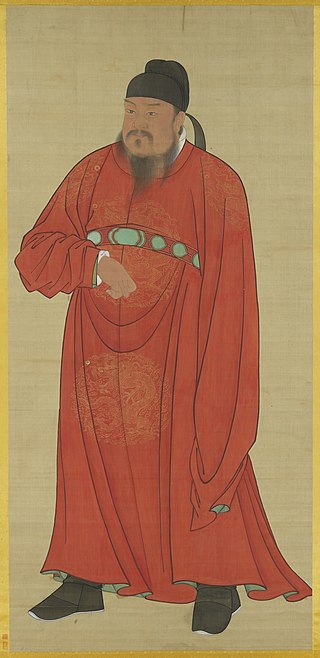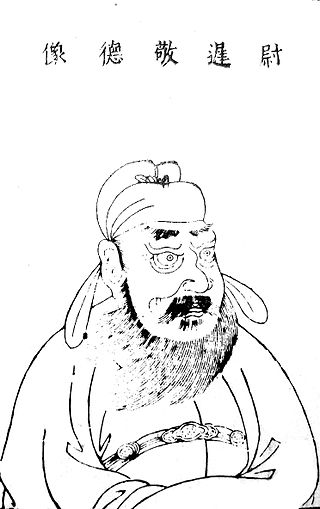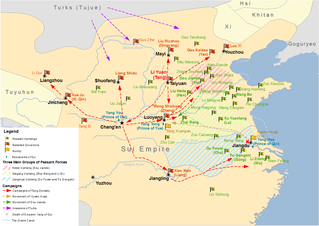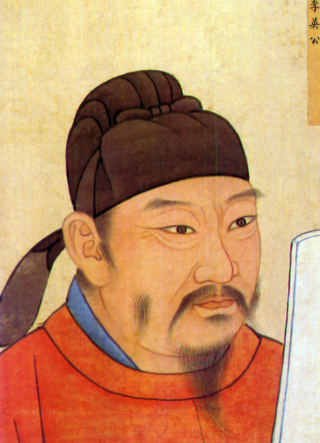The 620s decade ran from January 1, 620, to December 31, 629.

Emperor Taizong of Tang, previously Prince of Qin, personal name Li Shimin, was the second emperor of the Tang dynasty of China, ruling from 626 to 649. He is traditionally regarded as a co-founder of the dynasty for his role in encouraging his father Li Yuan to rebel against the Sui dynasty at Jinyang in 617. Taizong subsequently played a pivotal role in defeating several of the dynasty's most dangerous opponents and solidifying its rule over China proper.

Emperor Gaozu of Tang, born Li Yuan, courtesy name Shude, was the founding emperor of the Tang dynasty of China, reigning from 618 to 626. Under the Sui dynasty, Li Yuan was the governor in the area of modern-day Shanxi, and was based in Taiyuan.

The Battle of Hulao, or Battle of Sishui, was a decisive Tang victory over the rival Zheng and Hebei-based Xia polities during the transition from Sui to Tang. The battle took place during the Luoyang–Hulao campaign on 28 May 621 when a Xia army – led by Dou Jiande, ruler of Xia – was defeated attacking a smaller Tang army – led by Prince Li Shimin – entrenched at the strategic Hulao Pass.

Wang Shichong, courtesy name Xingman (行滿), was a Chinese military general, monarch, and politician during the Sui dynasty who deposed Sui's last emperor Yang Tong and briefly ruled as the emperor of a succeeding state of Zheng. He first became prominent during the reign of Emperor Yang of Sui as one of the few Sui generals having success against rebel generals, and during Yang Tong's brief reign, he was able to defeat the rebel general Li Mi and seize Li Mi's territory. After becoming emperor, however, he was unable to withstand military pressure from Tang dynasty forces, forcing him to seek aid from Dou Jiande the Prince of Xia. After Dou was defeated and captured by the Tang general Li Shimin, Wang surrendered. Emperor Gaozu of Tang spared him, but the Tang official Dugu Xiude (獨孤修德), whose father Dugu Ji (獨孤機) had been executed by Wang, assassinated him.
Feng Lun, courtesy name Deyi, better known as Feng Deyi, formally Duke Miao of Mi, was a Chinese official of the Sui and Tang dynasties who served as a chancellor during the reigns of Emperor Gaozu of Tang and Emperor Taizong of Tang. He was praised for his quick thinking but criticized by historians for his being overly attentive to the emperors' desires.

Qin Qiong, courtesy name Shubao, better known as Qin Shubao, was a Chinese general who lived in the early Tang dynasty of China. Along with Yuchi Gong, he continues to be worshipped in China as a door god. He is also known by his posthumous name Duke Zhuang of Hu.

Yuchi Gong (尉遲恭) or Yuchi Rong (尉遲融), courtesy name Jingde (敬德), also known by his posthumous name Duke Zhongwu of E, was a Chinese military general who lived in the early Tang dynasty. Yuchi Jingde and another general Qin Shubao are worshipped as door gods in Chinese folk religion.
Hulao Pass is a choke point northwest of Xingyang, Henan province, China in the foothills of Mount Song. It is the site of many historical battles, being the eastern guard for the capital Luoyang for several dynasties. With Mount Song to the south, the Yellow River to the north, the pass holds up a formidable defense. Many defensive structures have been set up here throughout history, dating from the Warring States period when a checkpoint is set up here. The pass became fortified in the Tang dynasty.

Dou Jiande was a Chinese rebel leader who led the agrarian rebels who rose against the rule of Emperor Yang of Sui near the end of the Chinese Sui dynasty. Generally considered the kindest and most able of the agrarian rebel leaders of the time, he was eventually able to capture the modern Hebei region and declare himself initially the Prince of Changle, and then the Prince of Xia. In 621, when the Tang dynasty general Li Shimin attacked Wang Shichong the Emperor of Zheng, who ruled the modern Henan region, Dou believed that if Tang were able to destroy Zheng, his own Xia state would suffer the same fate, and therefore went to Wang's aid, against the advice of his strategist Ling Jing (凌敬) and his wife Empress Cao. Li defeated him at the Battle of Hulao, capturing him. Li's father Emperor Gaozu of Tang subsequently put Dou to death. Xia territory was briefly seized by Tang, but soon Dou's general Liu Heita rose against Tang rule, recapturing Dou's territory, and held out against Tang until 623.
Empress Cao was the wife of Dou Jiande, an agrarian rebel leader who claimed the title of Prince of Xia at the end of the Chinese Sui dynasty.
Xu Yuanlang (徐圓朗) was an agrarian rebel leader who rose against the rule of the Chinese Sui dynasty late in the reign of Emperor Yang of Sui. After doing so, he did not initially claim any royal title, instead successively submitting nominally to Li Mi the Duke of Wei, Emperor Yang's grandson Yang Tong, Dou Jiande the Prince of Xia, and the Tang dynasty. After Dou was defeated and killed by Tang in 621, Xu briefly re-submitted to Tang, but rose again later that year when Dou's general Liu Heita the Prince of Handong rose against Tang, allying himself with Liu. He claimed the title of Prince of Lu. Tang forces defeated both Liu and Xu in 622, and Xu was killed in flight in 623, ending Xu's state of Lu.
Liu Heita was an agrarian rebel leader during China's transition period from the Sui dynasty to the Tang dynasty, who initially successively served under Hao Xiaode (郝孝德), Li Mi, and Wang Shichong. He eventually followed Dou Jiande the Prince of Xia. After Dou was killed by Emperor Gaozu of Tang in 621 and his territory was taken by Tang, Liu rose to avenge Dou, and briefly recaptured Dou's territory, north of the Yellow River.

The transition from Sui to Tang (613–628), or simply the Sui-Tang transition, was the period of Chinese history between the end of the Sui dynasty and the start of the Tang dynasty. The Sui dynasty's territories were carved into a handful of short-lived states by its officials, generals, and agrarian rebel leaders. A process of elimination and annexation followed that ultimately culminated in the consolidation of the Tang dynasty by the former Sui general Li Yuan. Near the end of the Sui, Li Yuan installed the puppet child emperor Yang You. Li later executed Yang and proclaimed himself emperor of the new Tang dynasty.
Li Yuanji, formally Prince La of Chao (巢剌王), more commonly known by the title of Prince of Qi (齊王), nickname Sanhu (三胡), was an imperial prince of the Chinese Tang dynasty. He was a son of the dynasty's founder Emperor Gaozu of Tang, and in the intense rivalry developed between his older brothers Li Jiancheng the Crown Prince and Li Shimin the Prince of Qin, he sided with Li Jiancheng and often advocated drastic actions against Li Shimin, including assassination. In 626, Li Shimin, fearing that Li Jiancheng and Li Yuanji were about to kill him, laid an ambush for them at Xuanwu Gate outside the palace and killed them. Li Shimin then effectively forced Emperor Gaozu to yield the throne to him.

Li Shiji, courtesy name Maogong, posthumously known as Duke Zhenwu of Ying, was a Chinese military general and politician who lived in the early Tang dynasty. His original family name was Xú, but he was later given the family name of the Tang imperial clan, Li, by Emperor Gaozu, the Tang dynasty's founding emperor. Later, during the reign of Emperor Gaozong, Li Shiji was known as Li Ji to avoid naming taboo because the personal name of Emperor Gaozong's predecessor, Emperor Taizong, had the same Chinese character "Shi". Li Shiji is also referred to as Xu Maogong and Xu Ji in the historical novels Shuo Tang and Sui Tang Yanyi.

The Battle of Yanshi was fought on 5–6 October 618 between the armies of Wang Shichong and Li Mi, rival contenders for the succession of the Sui dynasty. Wang, who was still ostensibly a Sui loyalist and had been blockaded in Luoyang for months by Li, gambled on a decisive battle and led his troops out to attack the besieging army. Li assembled his forces on a naturally defensible position north of Yanshi town, but Wang managed to surprise Li's forces and approach their camp before they could react. Aided by a secondary cavalry attack from the rear, Wang secured a decisive victory over Li's forces. Although Li managed to escape with part of his army, his authority was shattered, and his followers joined Wang. While Li sought refuge in the rival Tang court, Wang consolidated his control over Henan and eventually deposed the Sui puppet ruler Yang Tong and declared himself as emperor of the new Zheng dynasty. Wang's power lasted until his surrender to the Tang prince Li Shimin in 621, and Li Mi was captured and executed by Sheng Yanshi.

Qutu Tong, titled Duke of Jiang, Xianbei name Tandouba (坦豆拔), was a general in the Sui and Tang dynasties of China. He was listed as one of 24 founding officials of the Tang dynasty honored on the Lingyan Pavilion due to his contributions in wars during the transitional period from Sui to Tang.

Shan Xiongxin was a general, top warrior and peasant uprising leader during the transitional era between the Sui and Tang dynasties.
Luo Shixin was a general during the transitional period between the Sui and Tang dynasties of China.












